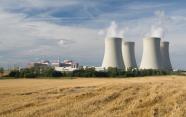Nearing Nuclear Fusion

France is leading the nuclear revolution right now. But it may also headline the nuclear fusion movement.
Fusion is responsible for powering the sun and stars. So, the goal is to imitate that process on earth, although it is extremely difficult and expected to take as much as 50 years to do.
Today's nuclear reactors use fission that produces energy when atoms are split apart. In contrast, fusion releases energy as atoms are combined -- a process that thus far consumes more energy than it generates. The aim is to heat hydrogen gas to more than 100 million degrees Celsius so that the atoms will fuse together instead of bouncing off one another. The end result of that fusion process is the production of 10 million times more power than a typical chemical reaction, such as the burning of fossil fuel.
That's why a consortium of 31 nations has come together, all to try and get over the hurdles. The costs will be split among the participants that include Russia, Japan and South Korea, with the United States expected to ante up about 10 percent, or $1.2 billion or the total $12.8 billion price. Existing experiments have shown it is possible to replicate the suns energy here on earth, the participants emphasized.
The so-called International Thermonuclear Experimental Reactor (ITER) is expected be built in France near the southern city of Marseille.
A long road is ahead of it. Because hydrogen plasma is heated to 100 million degrees Celsius, it will damage the vessel that contains the substance. Those are expensive parts that would often have to be replaced. Already, researchers have spent four decades and $20 billion on the concept. Beyond that, the energy landscape could look drastically different by in 50 years when fusion would come to pass.
Proponents of nuclear fusion beg to differ with that viewpoint. They say that the current global energy market is now valued at $3 trillion a year -- an amount that will expand proportionately as developing nations modernize their economies. Much of that consumption is fossil fuel-fired and any energy source that can displace that value would help better the human condition and the environment, they say.
So what do you think? Please share your thoughts by posting a quick comment below, or by sending me a longer reply to energybizinsider@energycentral.com.
Copyright © 1996-2010 by CyberTech, Inc. All rights reserved.
To subscribe or visit go to: http://www.energycentral.com
To subscribe or visit go to: http://www.energybiz.com